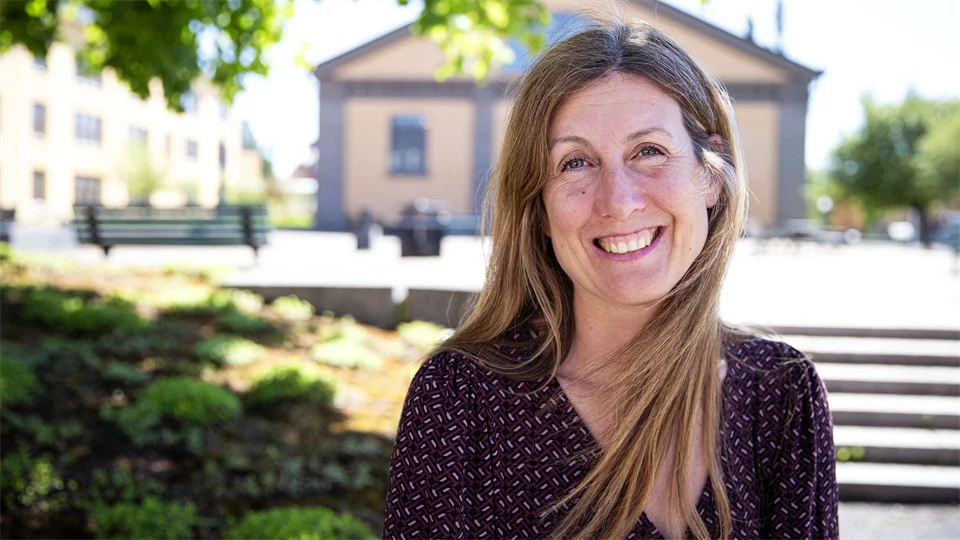The social dimension is most important to Anna Longueville
Anna Longueville, teacher in environmental science and program director at Ecoentrepreneur Sustainable Development, is a master of digital education. So much so that she has received an award for her teaching and now works with pedagogical development, among other things.
Co-creative pedagogy, the social dimension and an inclusive culture where students constantly give feedback are Anna Longueville's success factors in the teaching profession.
"When I started as a teacher, I did what most people do; I taught in the same way I was used to as a student. In my case, it was a mix of lectures, where only the teacher spoke (fast!) and seminars where the students had prepared by reading or making a presentation. The discussions were very important to me as a student, I thought that was when things that I had read and written about landed in place. So the deliberative conversations, where you don't need to know at all, but there is an opportunity to discuss how you have understood it and what you have not understood, they have always been central to me as a teacher.
Based on the group of students
After she studied higher education pedagogy and gained more knowledge about theories of distance education, Anna started working on the basis of the "Community of Inquiry".
"It was partly to build a lesson plan that was based more on student-activating methods, that is, on the knowledge and understanding that particular student group has right now and that it is the students who are the ones who do the most in the lessons. I had a plan for what I wanted the students to be at the end of the course, but what that journey looks like is a little different each time, based on that particular group of students. This means that I both have a lot of planned lessons and take different parts in the order in which I listen to the students. Often it consists of long lists of things that I think will come up at the discussion seminars, but the order is different. Sometimes I control more, sometimes less, also depending on the student group.
The social dimension is important
"After a while, I noticed that the factor that seemed to play the biggest role in both how well it works in the lessons and the students' study results was above all the social dimension. At first I was frustrated about it, how the students enjoy each other's company is difficult to control! Then I thought that I have to do what I can. If I try to be a role model and build a climate that I would thrive in, where everyone is welcome and you have room to be who you are, then maybe it will be possible. I think a lot can be done, but it is of course the students who do most of the work to create the atmosphere. The groups of students who are friendly and inclusive with each other have so much more fun and much better study results.
– I just got this from a student who graduated this spring: "Thank you for fantastically fun (and challenging 😅!) years, your support and guidance has been so valuable and I am so grateful!" I think when I read it that sometimes you succeed in what you want to achieve. What fantastic students I have the privilege of having!
Feedback as co-creative pedagogy
"The way I work now, it's really the students who have been involved in developing. Without their feedback, which I ask for and also try to build a culture where we work to create together - co-creative pedagogy, it would not have happened! I constantly ask them what they want to do, and I always tell them how I have envisioned the arrangement. I don't think the focus of teaching should be on me standing and talking, I want the students to talk.
However, the key for teaching to work is to have a good structure in the learning platform, she believes.
"Especially the distance students find it difficult to catch up with us in the corridor and ask questions, so I work a lot to have all the information ready and available to the students before the course starts. All the plans are out, all the instructions are there, I am clear about what I expect from them and how much time they are expected to spend on a task. If someone emails a question, I email the answer to everyone.
Today, Anna teaches six courses per academic year, and most of them are taught both on campus and remotely. She also teaches teachers in higher education pedagogy. In 2020, she received the Students' Pedagogical Award for her distance teaching.
To learn more about the Community of Inquiry
Anna takes support from the Community of Inquiry in the planning and design of her courses. If you want to read more about this, researchers at Athabascau University have created a platform to collect publications and other materials to support those who are interested. You can also search via the library's search services to find articles in different areas.
